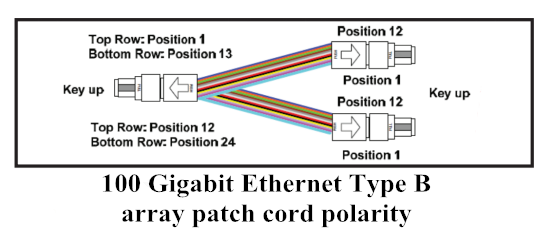How to Upgrade Your Network to 40/100 GbE?
1G and 10G data rates are not adequate to meet the future needs of high-bandwidth applications. The requirement for higher data rates is being driven by many factors. Switching and routing, virtualization, convergence and high-performance computing environments are examples of where these higher network speeds will be required, which will drive the need for a migration from 10G to 40/100G interfaces. Upgrading you network from 10G Ethernet to 40G and 100G is not as easy as swapping out switches and line cards. How to more easily upgrade your network to 40/100G Ethernet? It will be introduced in the following text.
IEEE published the IEEE 802.3ba standard for 40 Gigabit and 100 Gigabit Ethernet in June 2010. Only the laser optimized multimode fiber (grades OM3 and OM4) are capable of supporting 40G and 100G Ethernet. 40G Ethernet and 100G Ethernet over multimode fiber uses parallel optics at 10 Gb/s per lane. One lane uses 1 fiber for each direction of transmission. 40G Ethernet requires 8 fibers. 100G Ethernet requires 20 fibers. The minimum performance that is needed to support 40 GbE and 100 GbE over multimode fiber is OM3 fiber for a distance of 100 meters. Cabling with OM4 fiber provides the capability to extend the reach up to 150 meters.
One challenge for upgrading your network to 40/100G Ethernet is readying the cabling infrastructure for 40/100G, experts say. Ensuring the appropriate grade and length of fiber is essential to smooth, seamless operation. This is a big consideration for users because it could mean re-wiring a significant portion of their physical plant, if not all of it. That could be an expensive and disruptive undertaking. At the physical layer, 40G Ethernet is essentially 4x10G "lanes". "100G is going to be even more of a challenge because now you're dealing with a whole new layer of physical infrastructure. You will have a whole new generation of optics, cables, everything will be a whole new generation at that point."
Migrating from 10 GbE (that uses two fibers in either a SC duplex or a LC duplex connector) to 40 GbE and 100 GbE will require a lot more fibers and a different type of connector. An effective migration strategy needs to provide a smooth transition to the higher Ethernet speeds with minimum disruption and without wholesale replacement of existing cabling and connectivity components. Optical fiber cabling is commonly deployed for backbone cabling in data centers for switch to switch connections and also for horizontal cabling for switch to server and storage area network connections. The use of pre-terminated optical fiber cabling can facilitate the migration path to 40G and 100G Ethernet.
All the components that are designed to migrate from 10 Gigabit to 40 Gigabit Ethernet are the same components that are used for 100 Gigabit Ethernet. The only difference is that a 100 Gigabit Ethernet connection is established using a Type B array patch cord that interconnects two, 12-fiber MPO connectors in the FX Ultra HD patch panels to one, 24-fiber MPO connector at the transceiver. The 100 Gigabit Ethernet, Type B array patch cord polarity is illustrated in the following picture. No changes to the patch panels or cabling are required. The 100 Gigabit channels can be added by using spare positions in the MPO adapter frames or by replacing the appropriate number of 40 Gigabit channels.

Fiberstore's pre-terminated optical fiber cabling provides an effective migration path to 40 Gigabit Ethernet and 100 Gigabit Ethernet using the same infrastructure by adding pre-terminated trunk cable assemblies and MPO adapter frames as needed. And we offer all kinds of connection choices for your 40 GbE and 100 GbE network applications. For example, HP JG709A compatible 40GBASE-CSR4 QSFP+ transceiver and Finisar FTL410QE2C compatible 40GBASE-SR4 QSFP+ transceiver, they are with high quality and you can buy from us with confidence.

